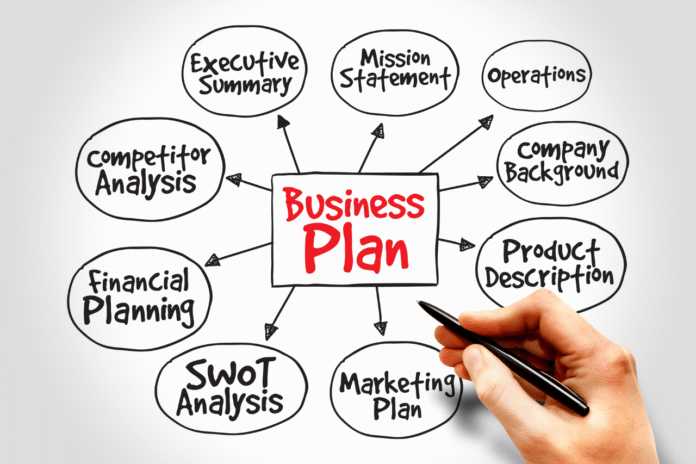A business plan is more than just paperwork it’s a strategic roadmap that outlines your goals, the structure of your business, and the steps required to achieve success. Whether you’re launching a startup, seeking investors, or managing daily operations, a business plan is essential.
In this detailed guide, we’ll walk you through:
- What a business plan is
- Why it’s important
- How to use it
- What to include
- The different types of business plans
- How to write one that sets you up for long-term success
What Is a Business Plan?
A business plan is a formal document that explains how your business will operate, grow, and achieve its objectives. It summarizes your business structure, vision, goals, operations, financial strategy, and market outlook.
Think of it as a living document that helps you, investors, team members, and partners understand your business model, competitive edge, and financial performance.
Definition: A business plan is a written document that outlines a company’s structure, objectives, key milestones, and financial projections to guide its operations and strategy.
Why Do You Need a Business Plan?
Creating a business plan is one of the smartest moves an entrepreneur can make. Here’s why:
- Clarifies your direction: It helps define your business’s vision and the steps to achieve it.
- Improves growth chances: Businesses with a solid plan grow up to 30% faster.
- Reduces risks: By identifying potential challenges early, you can avoid costly mistakes.
- Increases confidence: Entrepreneurs who plan feel more confident even during crises.
- Tracks performance: It allows you to review what’s working and adjust your strategies accordingly.
Regularly updating your plan is just as important as writing it. A current plan keeps you aligned with your business goals and market realities.
What Can You Do With a Business Plan?
A business plan isn’t just a formality. It’s a powerful tool that can be used in several ways:
1. Validate a Business Idea
Before launching, use your plan to test whether your idea is viable. Include market research, competitive analysis, startup costs, and sales projections to identify profitability and demand.
2. Set Goals and Strategy
A business plan helps you define clear goals, performance indicators, and growth milestones. It becomes your strategic guide to making informed decisions.
3. Secure Funding
Lenders and investors require a business plan to evaluate your opportunity. Your plan should include financial forecasts, funding requirements, and how the funds will be used.
4. Improve Business Management
Use your plan to track operations, analyze performance, and make strategic adjustments. A well-maintained plan helps you stay on course as your business evolves.
Key Components of a Traditional Business Plan
To write a comprehensive business plan, here are the essential sections you need to include:
1. Executive Summary
This is the overview of your business and its strategic direction. Include:
- The problem you’re solving
- Your product or service
- Target market
- Business model
- Financial snapshot
- Funding requirements
💡 Pro tip: Write the executive summary last even though it appears first in your plan.
2. Products & Services
Explain what you’re offering and how it solves your target market’s problem. Include:
- Unique value proposition
- Competitive analysis
- Future product development
- Achievements like pre-orders or partnerships
3. Market Analysis
Understand your industry, customers, and competitors. Analyze:
- Market trends and opportunities
- Customer demographics and behavior
- Competitor positioning
- Industry challenges
4. Marketing & Sales Strategy
Outline how you’ll attract and retain customers. Cover:
- Pricing strategy
- Promotion channels (e.g., social media, ads, email)
- Sales processes
- Sample campaigns or brand messaging
Add a SWOT analysis (Strengths, Weaknesses, Opportunities, Threats) to show your strategic positioning.
5. Organization & Management
Detail your company’s legal structure and team. Include:
- Business registration info
- Management roles and bios
- Organizational chart
- Gaps to fill in hiring
6. Financial Projections
This is a crucial part of your business plan. Provide:
- Revenue forecasts
- Profit and loss statement
- Cash flow projections
- Balance sheet
These figures should align with your business goals and be based on realistic assumptions.
7. Appendix
Include supporting materials such as:
- Legal documents
- Product images
- Contracts or MOUs
- Additional charts or data
Types of Business Plans (And When to Use Each)
Not all business plans are created equal. Choose the type that fits your needs:
✔ Traditional Business Plan
The most detailed option, best for:
- Pitching to investors
- Applying for bank loans
- Managing a complex business
✔ Business Model Canvas
A quick, visual approach that’s perfect for:
- Exploring a new business idea
- Brainstorming with a team
- Mapping out operations on one page
✔ One-Page Business Plan (Lean Plan)
A simplified, bullet-point version used for:
- Internal strategy
- Testing new business models
- Fast updates and iteration
✔ Growth Plan
Focuses on financial health and scaling. Ideal for:
- Businesses in growth mode
- Strategic planning and forecasting
- Ongoing performance reviews
Growth plans are dynamic, easy to update, and especially helpful for managing through uncertainty.
How to Write Your Own Business Plan
Ready to build your business plan? Here’s how to get started:
- Choose a format (traditional, one-page, canvas, or growth)
- Use a free template or online business plan builder
- Fill in key sections like your executive summary, market research, and financials
- Review and revise regularly based on performance
Tip: Platforms like LivePlan can guide you through the process with templates, examples, and AI-powered insights.
Your Business Plan Is Your Blueprint for Success
Writing a business plan helps you:
- Explore and validate ideas
- Set goals and measure progress
- Secure funding with confidence
- Manage operations and adapt to change
Whether you’re just starting out or looking to grow, a business plan is the foundation of your success. Don’t treat it as a one-time task make it a living document that evolves with your business.

